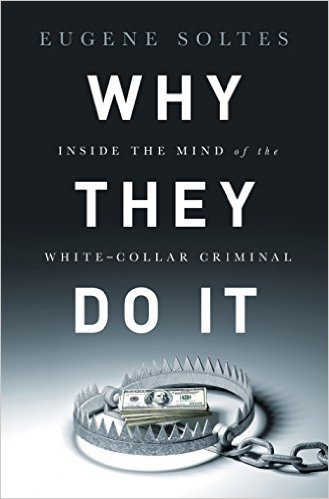Why They Did It: Madoff and Enron’s Fastow Explain the Biggest Frauds in U.S. History

Why do business executives—people who already possess status and wealth—commit financial crimes?
Eugene Soltes offers some interesting theories in his new book, Why They Do It: Inside the Mind of the White-Collar Criminal, including the notion that many senior business people operate in a moral "gray zone." An associate professor at Harvard Business School, Soltes posits that they step over the line—breaking accounting rules or making illegal insider trades—in part because they rely on intuition. And, it turns out, their instincts stink.
More compelling than his analytical efforts, the author's unusual research method ought to draw a large audience to his book. With an admirably naive eagerness, Soltes wrote letters to some four dozen convicted criminals, ranging from Ponzi scheme legend Bernard Madoff to Andrew Fastow, late of Enron Corp., to Dennis Kozlowski, once the chief executive of Tyco International Ltd. Lo and behold, many of them wrote back.
Soltes thus had the opportunity to pepper his book with the first-person observations and self-justifications of a colorful Murderers' Row of white-collar crime. Here are some examples:
I’ll pay them all back. Promise.
"It's like a comedy of errors," Madoff told Soltes. "To cover the losses, I decided to take in money from hedge funds. And in order for me to do that, I had to commit to a long-term strategy that I wouldn't send the money back [to investors]. I kept taking in more money, figuring that once the market allows me to do the strategy, I will be able to fix it."
That's the classic explanation of supposedly well-intentioned Ponzi masters: Eventually the scam will miraculously produce profits and everyone will be made whole. Madoff, 78, has plenty of time for correspondence, as he's serving a 150-year federal prison sentence.
They set me up.
"It is all part of the biggest theft caused by a U.S. government agency in U.S. history," Robert Allen Stanford, 66, complained to the author. Stanford is serving a 110-year prison sentence after being convicted of charges related to his investment company operating as a Ponzi scheme. "I will win this war," he added. "Make no mistake, Eugene, I am going to win." (A federal appeals court turned him down in October.)
Having read Soltes's accounts of these and other white-collar characters, one answer comes into focus above all others to the author's question of why they did it.
They did it because they thought they could get away with it.
Why They Do It: Inside the Mind of the White-Collar Criminal is scheduled to be published Oct. 11.
https://www.amazon.com/Why-They-Do-White-Collar-Criminal/dp/1610395360